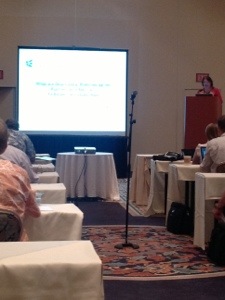Research
HICCS – Session Spotlight
DISCLAIMER: I am live blogging this from the conference, so please forgive any typos. 🙂
Today at HICCS I am attending some sessions in the cloud service science and systems track. I am interested to see some of the research in this area considering I have done research in this area (mostly related to adoption of cloud computing and cloud curriculums) and also have doctoral students doing their dissertations in this area. I was also a reviewer for this particular track.
The first paper being presented is particularly interesting to me. It is on developers preference on platform as a service.
The researchers here did a literature review to create a working definition for PaaS and performed a study to discern what developers preferred in a PaaS platform. They started with discussions with focus groups and experts and used that to create an online survey. The results of the survey were then analyzed using conjoint analysis and exploratory factor analysis.
“Must have” features such as availibility and standardized API’s were identified and excluded from the analysis. The researchers then identified 10 different attributes that would be evaluated via the survey. They had a total of 103 respondents that all had PaaS experience.
The results showed that developers preferred offline SDKs to online development environments, they wanted knowledge sharing features to be built in to the community, there was a preference for a marketplace that handled payments, and they preferred pay per use pricing versus other pricing models. They were relatively split on migration between PaaS providers where about half wanted migration to be included as a service and about half preferred tools for migration.
I plan on going into the proceedings and reading the actual paper in more detail and may have more to say about this, but at this time I can see where most of these results are coming from. The only thing that is a bit weird to me is the migration issue.
If you are developing on a platform (ex. Azure), what is the chance that you are going to migrate to another platform? I can see where cost issues might influence the desire to migrate, but if you are developing for a platform, you are generally developing an application based on the characteristics of that particular platform. That being said, would it be smart to try to migrate your application to a different platform that may have other characteristics? I’m not quite sure.
Anyway, that is my in conference update for today. I will try to post another update on a paper I find interesting for each day of the conference.
Aloha!
Headed to Maui
I am writing this post on the flight to the Hawaiian International Conference on Systems Sciences (HICCS). As far as conferences go in my field, this one is pretty prestigious. In fact, I believe it is the number 2 ranked conference in the discipline. The fact that it is Maui doesn’t hurt though either! However, the 12 hours on an airplane, that’s a different story (see below).
I am presenting a paper that I wrote with a colleague from Colorado State University on the use of social media as a way to facilitate knowledge transfer in the Chamorro culture of Guam. This is a topic that is very dear to my co-author since she is a descendant of the Chamorro culture.
The Chamorro people are in danger of losing their language and teachings because the elders are not passing the lessons down to the next generations. We examined how the Chamorro were using social media to try to preserve the culture through sharing information on the sites.
I will send some updates throughout the week. Aloha!
Workshop on Information Security and Privacy
I recently presented a paper at the Workshop on Information Security and Privacy (WISP) in Orlando, FL. WISP is an official auxiliary meeting to the International Conference on Information Systems.
I have to say the conference was very good and it was nice to see all of the different research being done in the area of security. My paper focused in on security education, training, and awareness programs (SETA). In brief, it argued that current programs focus more on education and pay little attention to making people aware of their environments so that they can make appropriate security decisions based on those environments.
We had a keynote speaker from the US Naval Academy that really opened our eyes to how vulnerable we are to cyber attacks. It also featured a great lunch (best conference lunch EVER) sponsored by a company named ProctorU. This company essentially proctors online students taking exams by watching them through their webcams.
I have attached some of the pictures of the event below courtesy of one of the conference organizers, Dr. Yair Levy.
It’s been a while!
Yes, I am aware that I haven’t posted in a while. I have been working on a few projects that have been taking up a LOT of time. However, I can’t wait to show them to you all very soon!
Exciting News and Furthering the Case for Academic Partnerships with Industry
Well, you can add one point to the tally for those folks that say MIS needs to be relevant to industry. It was announced today that UALR has received some substantial grants from Microsoft! I had been holding off posting about this until the press release came out.
Microsoft Contributes $3.5 Million In-Kind to UALR College of Business
LITTLE ROCK, Ark. (Feb. 1, 2011) – UALR’s College of Business has received three significant in-kind software contributions from Microsoft Corp., including operating systems and the cutting edge Azure Cloud technology. The gifts are valued at $3.5 million.
“Microsoft recognizes the value of education in training the business leaders of tomorrow and is
proud to contribute its technology to your outstanding educational program,” Dr. Bradley K.
Jensen, principal academic relationship manager at Microsoft Corp., told Business
Dean Anthony F. Chelte.Most of the $3.5 million is for students and faculty to use its enterprise software for a year. Also, the company offered Azure software access and storage for management information systems (MIS) curriculum and research over the next year, valued at $15,000 to include the access fee, data storage fees, and utilization fees.
Microsoft additionally donated Client Access Licenses for the MIS programs to use for a year.
This software donation is currently valued at $52,000.Microsoft intends to renew these licenses for the College of Business annually for the
foreseeable future, Jensen said.“The Microsoft partnership that our management information systems faculty has developed
significantly enhances our ability to offer our students a high quality, focused, and relevant
business education,” Chelte said. “Without this level of support, we would not be able to
provide this type of high-level technology exposure to our students, which certainly gives them
an advantage when applying for jobs.“My faculty and I are grateful to Dr. Jensen and Microsoft for enabling our grads to have an even-more valued degree.”
I am really proud of this because it shows what can result from developing partnerships with industry. How do you do this? Well, in general, you have to show industry that you can provide something that benefits them first. Once you do that, then it will be in their best interest to provide resources to continue the partnership.
Sounds simple, right? The problem is that for industry to buy into a program, that program has to be selling something. And this is where most IS programs fall woefully short in my opinion. So that leads us to the next question. How do I sell my program to industry partners so they buy in? I will give you some suggestions that have worked for my colleague and I as we developed our industry partnerships.
- Participate in student competitions such as the Microsoft Imagine Cup or any other student competition. Your students are the product of your program. You need to find every way you can to showcase how good they are as that will reflect directly on your program.
- Engage industry to help provide student projects for your program. Most organizations have more projects and problems than they can handle and they are generally very happy to get free labor. Our MIS capstone course has accomplished this with great success. It was difficult at first, but now we have people knocking down our door to work with our students. This will further showcase the quality of student that you have, possibly result in higher placement rates that will strengthen your program, and also deepen the ties that you have with industry.
- Engage in research that is relevant to industry. Now I am not saying that you shouldn’t wax theoretical from time to time, but if you get too many people with their heads in the clouds and out of touch with the problems of industry, they will stop paying attention to you. Find out what problems that industry is having and work to solve them. You might find that they will be willing participants in your research, which could result in you being much more productive from that prospective.
There are other ways as well, but these are the ones that we have found to be the most effective. Now I will not lead you down a primrose path. This takes a lot of work! However, if you do the work to make your program visible to industry partners and do it right, the rewards are well worth it for both your program and your students.
Aloha from HICCS
Aloha!
I am currently on the beautiful island of Kauai in Hawaii attending the Hawaiian International Conference on System Sciences (HICCS). It has been really great meeting with fellow researchers, vetting ideas, and generating new research projects.
One person that I talked to at the conference wasn’t an academic, but a practitioner of IS. What amazed me about our discussion were some of the problems that she told me organizations out there were facing. While the problems are all complex (most organizational problems are), I didn’t hear anything that was impossible to fix. Most of the problems had to deal with data sharing and integration in various areas. For example, integrating disparate medical records into a single record.
In the upcoming weeks I will start to blog more about the research that I am involved in. Hopefully you will find it to be interesting.
Aloha!






